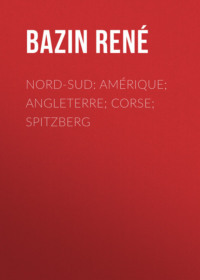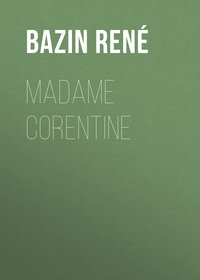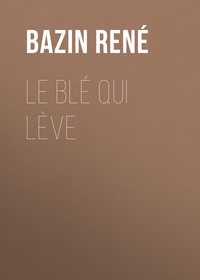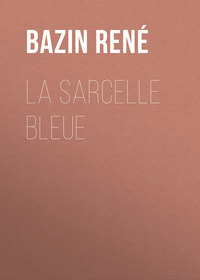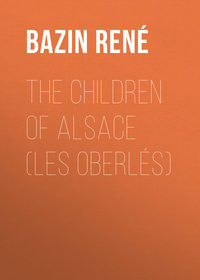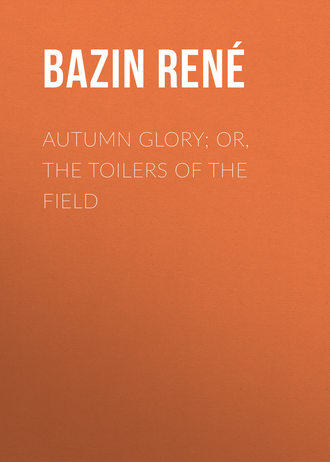 полная версия
полная версияAutumn Glory; Or, The Toilers of the Field
The separation was accomplished. At the moment that the farmer drove away, intent upon the hope of still recovering his children, Eléonore had hurriedly left the shelter of the barn where she had been hiding, and, despite the entreaties of Marie-Rose and even of Mathurin, going from room to room she had hurriedly collected the little store of personal clothing and trinkets belonging to her. To all Rousille's pleading, as to the calmer adjurations of Mathurin, she had replied:
"It is François' wish, my dears! I cannot tell if I shall be happy; but it is too late now. My promise is given."
She was so greatly in fear of seeing her father come back that she was almost frenzied with haste. Quickly she made up her bundle, went out from La Fromentière, and reached the hollow road, where, crouching beneath the hedge, she waited for the steam tram that runs between Fromentière and Chalons. There some hours later François was to rejoin her.
Meanwhile the farmer, driving La Rousse at her greatest speed, had returned home.
"Eléonore!" he had cried.
"Gone," Mathurin had answered.
Then, half-mad with grief, the old man had flung the reins across the steaming beast, and without a word of explanation had stridden away in the direction of Sallertaine. Had he been actuated by a last hope and idea? Or did his deserted house inspire him with dread?
Night was falling. He had not yet returned. A damp, encircling mist, silent as death, enveloped all around. In the living-room of La Fromentière, beside the fire that no one tended, beside the simmering pot that murmured as if in low plaint, the two remaining inmates of the farm sat watching, but how differently! Rousille, nervous, burning with fever, could not keep still; she was for ever rising from her chair, clasping her hands, and murmuring: "My God, my God!" then going to the open door to look out, shivering, into the dark, thick night.
"Listen!" she said.
The cripple listened, then said:
"It is the goatherd of Malabrit taking home his flock."
"Listen again!"
A distant sound of barking, borne on the silent air, died away in the stillness.
"That is not Bas-Rouge's bark," returned Mathurin.
So from hour to hour, and minute to minute, a step, a cry, the rolling of a vehicle, would keep their senses on the alert.
What were they expecting? Their father, who came not. But Rousille, younger, more credulous, was expecting the others too, or if not both, at least one, either François or Eléonore, who, repentant – was it too much to hope – had come back. Oh, what joy it would be, what rapture to see one of them! It seemed as if the other would have the right to go if one came back to take his place in the home. The young girl felt raised out of herself as a vague sense of duty came over her; she, the only woman, the only one to act in her deserted home.
Mathurin sat in a stooping posture by the hearth, his feet wrapped in a rug, the glow of the fire reddening the beard crushed beneath his chin. For hours he had sat so, never moving, speaking as little as possible; from time to time tears rolled down his cheeks; at other times Rousille, looking at him, was astonished to see the shadow of a smile cross his face – a smile she could in nowise understand.
Nine o'clock struck.
"Mathurin," exclaimed the girl, "I am afraid that some misfortune has befallen father."
"He may be talking over his trouble with the Curé, or the Mayor."
"So I tell myself; yet, all the same, I am frightened."
"That's because you are not accustomed to wait as I am. What do you want to do?"
"To go towards Sallertaine to meet him."
"Go, if you like."
Rousille ran to her room to get her black cloak. When she came back, looking like a little nun, she found that Mathurin had thrown off the rug, and was standing up. His crutches were lying on the ground, and by an effort of will he stood nearly upright, resting one hand on the table, the other on the back of his chair. He looked at his sister with an air of pride and of suppressed pain, perspiration standing on his forehead.
"Rousille," he said, "what should you do if father did not come back?"
"Oh, don't say such things," she exclaimed, covering her eyes with her hand. "And do not exert yourself to stand like that; you make me feel quite ill!"
"Well, I," continued Mathurin gravely, "should take the management here. I feel strong enough. I feel that I am recovering."
"Sit down; sit down, I beg of you. You will fall."
But he remained standing until she reached the door. Scarce had she crossed the threshold before she heard the human mass sink together with a groan. She turned back, saw that he was in a sitting posture on the chair, pressing both hands to his side, doubtless to still his fast-beating heart; then noiselessly, timid as a fawn rising out of the bracken, she ran into the courtyard, and out on to the road.
The rising moon had lessened the mist, already one could see a considerable distance; in another hour it would be clear moonlight. Avoiding the shade of the hedges, Marie-Rose followed the middle of the path that, leading past the dwarf orchard, skirted the meadows; she was frightened, almost running, nor did she slacken speed until she reached the edge of the Marais, where the road suddenly widening like a river that falls into the sea, mingled its grasses with those of the marshland. Then, reassured by the moonlight, she stood still and listened. Where could her father be?
She hoped to hear footsteps on the road, or even Bas-Rouge's bark. But no; in the dream-like mist that incessantly formed and dispersed about her, amid the dim moving lights and shadows around, there was but one sound, that of the distant roll of the sea against the shores of La Vendée. She was about to turn, follow the dyke to reach the bridge of Sallertaine and its familiar houses, when a well-known whistle, like that of a plover, met her ear. Could it be possible?
The young girl's blood rushed to her heart; she stopped short in rapture and astonishment, without strength to look behind her. Motionless she stood, listening to the coming of one her heart had recognised. He came by the road she had come, from the thickets of La Fromentière. Erect, trembling, she stood on the grass-grown road, felt two hands placed on her shoulders, then a rush of air that moved the right side of her cloak, and a man had lightly sprung in front of her, with the words:
"It is I, Rousille. I have not frightened you?"
There he was in his brown coat, stick in hand, looking well pleased at his piece of audacity.
Notwithstanding her distress, Rousille could not repress a cry of joy. A smile rose to her face like an air bubble on troubled waters that none can hinder, and that widens as it goes.
"Oh how happy I am!" she said. But then quickly resumed: "No, I am wrong to speak like that. You do not know of our trouble at home. François has gone, Eléonore has gone; I am all alone there, and I have come out to find father, who has not come home. I have no time to spare for you, Jean Nesmy. It would be wrong!"
He watched the smile fade from her face in the moonlight; and as she drew her cloak about her to resume her way, he said hurriedly:
"I know all, Rousille. For the last three days I have been at Chalons trying to find a situation as near here as possible. I have not found one. But this evening I heard of François' going; it is the talk of the town in one way and another. I ran at once to La Fromentière, keeping out of sight. I watched you in the garden, in the barn. Since sundown I have heard you crying; but the farmer was the only one I saw go out."
"Where is he – at Sallertaine?"
"No; he went, but came back. I was in hiding about here. He passed just where we are now standing, and he was gesticulating and talking to himself as if he were demented."
Terrified, she asked:
"Was that long ago?"
"A quarter of an hour."
"Which way did he go?"
Jean Nesmy pointed in the direction of the mainland, and to the wooden heights further away.
"To the grounds of the Château, I believe. He jumped the fence some hundred yards from here."
"Thanks and good-bye, Jean. I must go."
But he, taking her hand, grew very grave in his turn.
"Yes," he replied, "I know quite well – but myself – soon you will have me no longer. To-morrow I am going home to the Bocage; and I came back to ask you one thing, Rousille. What shall I say to my mother to-morrow when she asks me, 'Is it really true that she loves you? What word of plighted troth did she give you when you parted? My poor Jean, when true-hearted girls see their sweethearts going away from them they say some word that is as binding as a betrothal ring, something to comfort him in absence. What did she of La Fromentière say to you?' If you have said no word, she will not believe me!"
The dim solitude enveloping them threw their shadows faintly on the grey grass. Rousille, her sweetheart's glowing eyes fixed upon her, answered sadly:
"Do not come back until Driot is well settled at home. Some months hence, in mid-winter, if our neighbours who frequent your markets tell you that he is working like a true farmer, that he is to be seen at fairs and gatherings, above all, that he is courting a girl at Sallertaine, then come back and speak to father. My father will not hear of a Boquin for son-in-law; but if I will have no other husband than you – if André speaks for me, who can tell? Father spoke well of you after you went."
"Really, Rousille? What did he say?"
"No, not now. I must be going. Good-bye."
He raised his hat with a natural courtesy that sat well upon him; nor did he seek to detain her longer.
Already Rousille, turning her back upon Sallertaine, was running across the meadow; she had reached the last bushes that border the Marais, her cloak fluttering in the mist. For more than a minute after she had disappeared beyond the fence Jean Nesmy remained motionless, on the same spot, where the words she had spoken were still ringing in his ears. Then slowly, as one learning by heart who looks not about him, he took his way towards Sallertaine and on from thence to Chalons. His heart sang with joy as he repeated to himself: "In mid-winter, if our neighbours who frequent your markets tell you that he is working like a true farmer, come back…"
The one thing he saw on the road to Chalons was that the topmost leaves of the willows were already turning yellow, and that the branches were growing leafless.
Rousille, through a gap in the fence, had made her way into a stubble field, thence through a narrow belt of wood. Then finding that she was in the gravel walk of an avenue, she paused, terrified by the solitude, and seized by the instinctive respect for the seigniorial domain, where even then her people ventured but rarely, from fear of displeasing the Marquis. She was in the outskirts of the park. On all sides, lit by the peaceful light of the moon, were sloping lawns, broken now by groups of forest-trees forming islands of black shade, now disappearing in the blue mist of distance. Sometimes in light, sometimes in shadow, Rousille followed the path, her eyes on the watch, her heart beating wildly. She was seeking marks of footsteps on the gravel; straining to see objects amid the dense thickets. Was that her father over there, that dark form through the wood? No, it was but the pile of a fence overgrown with brambles. Everywhere thorn-bushes, roots, dead branches impeded the moss-grown paths. How neglect had grown with years! The master absent, all was deserted, gone to waste. As she pursued her way, Rousille began to realise more keenly her sorrow at her brother's and sister's flight. They too, perhaps, would never come back to their home; fear in her gave place to grief.
Suddenly, the path winding round a clump of cedars, she found herself in front of the Château, with its huge main building flanked by towers and pointed roofs, on which the weather-cocks that once told the direction of the wind were now motionless with rust. Night owls were silently chasing each other round the gables; the windows were shut, the ground-floor secured with shutters strongly battened.
Anxious as she was, the young girl could not but stop for a moment to look at the melancholy pile, stained by winter rains, already as grey as any ruin; and as she stood there on the broad carriage-drive, her ear detected a distant murmur of words.
"It is father," she thought without a moment's hesitation.
He was sitting some hundred yards away from the Château, on a bench that Rousille knew well, placed in the half-bend of a group of birches, and called by the country people the bench of the Marquise. Bent double, his head resting on his hands, the old man was looking at the Château and down the avenues that sloped towards the Marais. Under the shadow of the birches Rousille drew nearer to him, and as she came closer, she began to distinguish the words he was saying, like a refrain: "Monsieur le Marquis! Monsieur le Marquis!" And as she hastened over the soft turf which deadened her footsteps, Rousille had the horrible dread that her father was mad. No, it was not that, but grief, fatigue, and hunger, of which he was unconscious, had excited his brain. Finding neither help nor support anywhere, in his despair instinct and habit had brought him to the door of the Château, where so often before he had come in sure hope of relief. He had lost all knowledge of time, and only continued to address his lament, "Monsieur le Marquis! Monsieur le Marquis!" to the ears of the master too distant to pay heed. The girl, throwing back the hood of her cloak, said softly so as not to startle him:
"Father, it is Rousille. I have been looking for you for an hour. Father, it is late – come!"
The old farmer shuddered, looking at her with absent eyes that saw not present objects.
"Only think," he said, "the Marquis is not here, Rousille. My house is going to ruin, and he is not here to defend me. He should come back when I am in trouble, should he not?"
"Of course, father, but he does not know of it; he is far away, in Paris."
"The others, the people of Sallertaine, they can do nothing for us because they are humble folks like ourselves, who have no authority beyond their farms. I have been to the Mayor, to Guerineau, to de la Pinçonnière, le Glorieux, de la Terre-Aymont. They sent me away with empty words. But the Marquis, Rousille, when he comes back – when he knows all! Perhaps to-morrow?"
"Perhaps."
"Then he will not leave me alone in my grief. He will help me; he will give me back François – eh, child? will he not give me back François?"
His voice was raised; the shrill words struck against the walls of the Château, that sent them echoing back in softened accents to the avenues, the lawns, until they were lost in the forest. The still, pure night listened as they died away, as it listened to the rustle of insects in the thickets.
Rousille, seeing her father in so great distress, sat down beside him, and talked to him for a while, trying to inspire a hope which she did not feel. And, possibly, a calming influence, a consoling power emanated from her, for when she said: "There is Mathurin at home, father, waiting for you," of his own accord he rose, and took his daughter's arm. For a long while he looked into the face of his pretty little Rousille, so pale with emotion and fatigue.
"True," he replied, "there is Mathurin. We must go."
And together they passed in front of the Château, turned into the avenue leading towards the servants' offices, and thence into the fields belonging to the farm. As they neared La Fromentière, Rousille felt that the farmer was gradually recovering his self-control, and when they were in the courtyard, with a rush of pity for the cripple, Rousille said:
"Father, Mathurin is very unhappy too. Do not talk much to him of your distress."
Hereupon the farmer, whose courage and clear reasoning had revived, passed his hand over his eyes, and preceding Rousille, pushed open the door of the house-place, where his crippled son lay stretched deep in thought, beside the nearly burnt-out candle.
"Mathurin, my son," he said, "do not worry overmuch … they have gone, but our Driot will soon be home again!"
CHAPTER VII.
DRIOT'S RETURN
"Our Driot is coming." For a fortnight La Fromentière lived on these words. Work had been resumed the day after the trouble. A farm-labourer, hired by Lumineau at Saint Jean-de-Mont, a tall, lean man, with thighs as flat as his cheeks, replaced Jean Nesmy, and slept in the room beyond the stable. Marie-Rose did, single-handed, the work before shared by both sisters: housekeeping, cooking, dairy-work, and bread-making. She rose earlier and went to bed later. Under her coif she ever had some wise idea in her little head which prevented her from thinking of the past; and in all her movements was displayed that silent activity that the farmer had loved in his old Luminette.
Mathurin had of himself offered to look after the "birds," that is to say, the stock of half-wild turkeys and geese bred at La Fromentière. Carrying a sack fastened across his shoulders, he would drag himself down every morning to the edge of the first canal of the Marais, where, at a part that widened out, were fastened the two boats belonging to La Fromentière. In the shallow water he would scatter his supply of corn or buck-wheat, and from across the meadows drakes with blue-tinted wings, ducks, grey, with a double notch cut on the right side of their beaks to mark them as belonging to Lumineau, would hurry and dive for their food. For hours Mathurin would find amusement in watching them, then, lowering himself gently into one of the boats, seated or kneeling, would try to recover the sure and rapid stroke which at one time had made him famous among the puntsmen of the Marais.
Toussaint Lumineau delighted to see him managing his boat near the farm, thus distracting his mind, as he thought, from the ever present regret. He would say: "The lad is regaining his old pleasure in punting. It can but be good for him and for us all." But to Mathurin, to Rousille, to his man, to the passers-by, sometimes even to his oxen, often when alone to himself, he would talk of the son so soon to be home again among them. Help was coming; youth and joy were returning to sorrow-stricken La Fromentière. At table nothing else was talked about:
"Only twelve days; only ten; only seven. I will drive to Chalons to meet him," said Lumineau.
"And I will make him some porridge," said Rousille, "he used to be so fond of it before he joined his regiment."
"And I" said Mathurin, "will go in the punt with him the first time he looks up his friends."
"How much there will be to hear!" exclaimed Rousille. "When he was home on furlough he had an endless store of tales to tell. As for me, I shall have no time to listen to them. I shall have to send him to you, Mathurin. And what a change it will make in the house to have a chatterbox among us." Then she added, with the grave air of one entrusted with the household purse: "One change we must make, father, and that will be to buy a paper on Sunday. He will not like to go without one; our André is sure to want to know the news."
"He is young," said the father, as if to excuse him.
And all André's predilections, every recollection connected with him, all the hopes that centred in his return were incessantly recapitulated by one and the other in the living-room of La Fromentière, where the caress of such discourses must have ascended more than once to the smoke-stained rafters.
Meanwhile the son thus occupying all their thoughts had not been told by any of them of the going of François and Eléonore. Partly from dislike to letter-writing, but principally to spare him pain, and to avoid giving him bad news on the eve of his homecoming, the blow which had so diminished the number of those he was to rejoin had been withheld from him. For they could not tell how he would take the absence of his favourite brother, his childhood's companion; it would be better to break the news to him gently, when he should have come back to France, back to his home. Soon a letter came, bearing the Algiers postmark, giving from day to day the itinerary of the journey; and under the elms of La Fromentière would be heard, every successive four-and-twenty hours, announced by one of the family lovingly, meditated over by the others, "Now Driot must be leaving Algiers." "Now Driot is on the sea." "Now Driot is in the train for Marseilles." "Children, he has reached the soil of France."
So one morning, which chanced to be the last Saturday in September, Toussaint Lumineau gave La Rousse a double feed of oats, and drew out from the coach-house a tilbury, the body and wheels of which were painted red. This tilbury was a relic of former prosperity, and as well known in all the country side as were the round head, white hair, and clear eyes of Toussaint Lumineau himself. He, harnessing the mare, looked so joyous and happy, that Rousille, who had not heard him laugh for many a day, as she watched him from the doorway, felt her eyes fill with tears, she knew not wherefore, as though it were the return of spring. The last strap buckled, the old farmer put on his best coat with upright collar, fastened the broad blue Sunday belt round his waist, and slipped two cigars at a halfpenny each into his coat pocket, a luxury he never indulged in nowadays. Then swinging himself up into the tilbury with a cheery, "Ohé, La Rousse!" he was off.
The mare started at such a pace that an instant later her headstall, ornamented with a rosette, looked like a poppy swept along the hedges by the wind. Bas-Rouge tore along after them. His master had called out on starting, "Driot is coming, Bas-Rouge! Come to meet him!" and the dog, all excitement, had dashed after La Rousse in ungainly gallop. Soon they had reached Chalons. Without slackening speed, the farmer drove through the streets, responding to the greeting of the landlord of the Hotel des Voyageurs, and nicely marking by the angle at which he raised his hat his sense of a tenant farmer's superiority over shopkeepers as he returned their salutations, then proudly erect upon the box-seat, tightening the reins, he turned in the direction of the railway station, some two miles beyond the town.
People looking after him, said:
"He has gone to meet his lad, that's certain. Well, poor fellow, he has had plenty of trouble, now he is having his share of good luck!"
La Rousse being restive, Lumineau alighted in the railway yard, and stood at the head of the mare. Thence could be seen the perspective of lines going towards La Roche – the lines by which one son had left, and the other was so soon to return to La Fromentière. He had not long to wait. The train dashed into the station with a whistle; the farmer was still quieting the mare, terrified by the noise, when the passengers came thronging out: townspeople, men-of-war's men on leave, fishmongers from Saint Gilles or Sables, and lastly a smart Chasseur d'Afrique, slight and tall, his képi well balanced, fair moustaches waxed to a point, his knapsack full to bursting, who, after looking eagerly round the yard, smiled and ran out with widespread arms:
"Father! Ah! what luck, it's father!"
The bystanders, indifferently looking on, saw the two men embrace each other with a strong, almost suffocating pressure.
"My Driot!" exclaimed the old man. "How happy I am!"
"And I too, father!"
"No, not so happy as I am! If you only knew!"
"What, then?"
"I will tell you. Oh, my Driot, the joy of seeing you again!"
They disengaged themselves from each other's arms. The young soldier adjusted his collar, and restored the equilibrium of his képi on the point of falling.
"Ah, I expect you will have no end of things to tell me, after all this long time? Important, perhaps? You will tell me by degrees at La Fromentière, while we are at work. Ever so much better than letters, eh?" And he threw back his fair head with a merry laugh.
His father could only respond with a faint smile; then, going towards the tilbury, one on either side, they swung themselves up with the elasticity of two men of the same age.
"Shall I drive?" asked André, and taking up the reins he gave a click with his tongue. La Rousse pricked up her ears, reared playfully to show that she recognised her young master, and with arched neck and eyes aflame, she soon left far behind the two empty hotel omnibuses, which were in the habit of racing each other on their way back from the station. Those who had exchanged greetings with the farmer on his way to the train, and many others, watched to see the two men pass by; clear-starchers looking out as they ironed; the little dressmaker from Nantes who came at the beginning of each season to take orders from her ladies at Chalons; shopkeepers standing at their doors; peasants at their dinners in inn parlours; all attracted by the sight of a soldier, or gratified to have a sign of recognition from the two Lumineaus. La Rousse trotted at such speed that the old man had not time to resume his hat between his salutations. Remarks followed the tilbury in the vacuum of air made by its rapid course.




